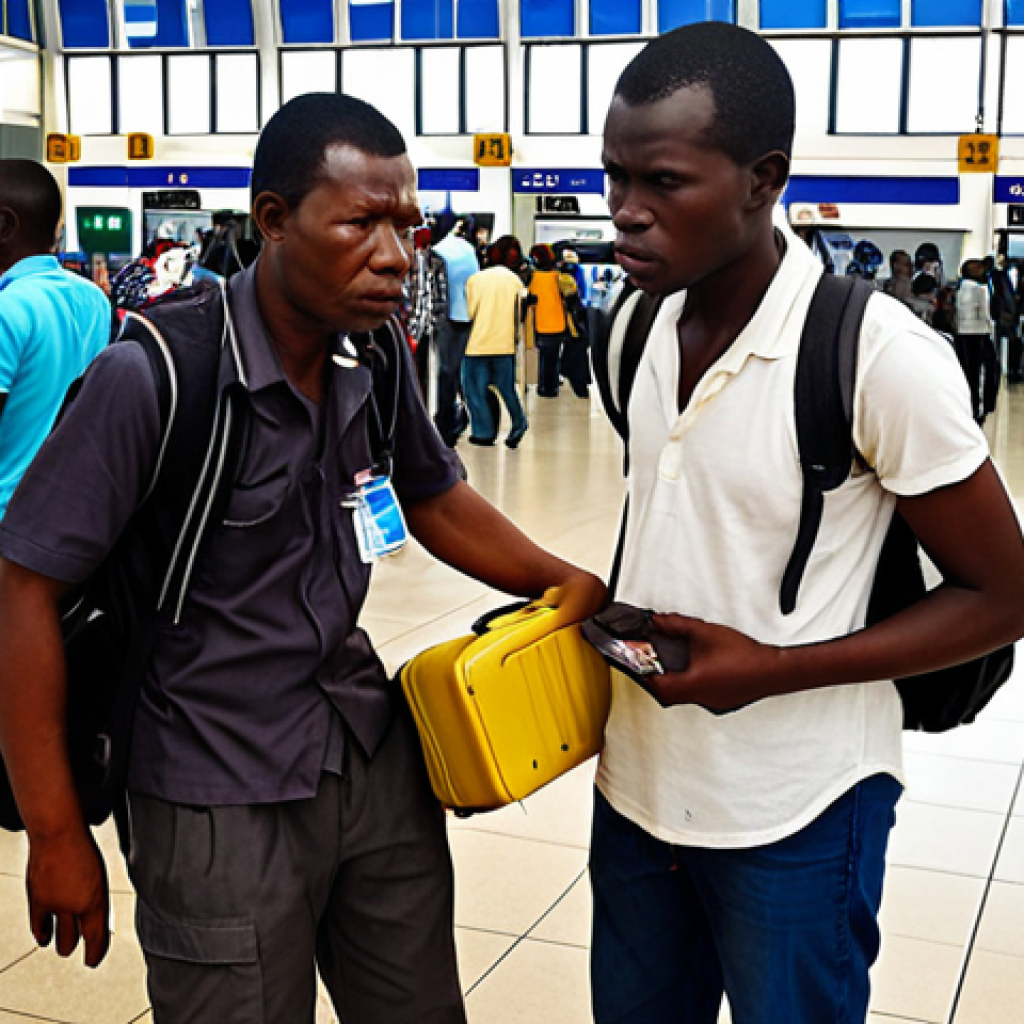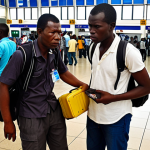Togo, a vibrant West African nation, beckons with its stunning landscapes and rich culture. However, like many developing countries, Togo faces certain challenges concerning safety and security.
While the country is generally welcoming to tourists, petty crime can occur, and it’s wise to be aware of potential risks. Based on recent reports and travel advisories I’ve scanned, political stability can also fluctuate, so staying informed about current events is key.
From my understanding after browsing several expat forums, most visitors have a positive experience by taking simple precautions. Let’s delve deeper into the specifics of staying safe and secure in Togo in the article below.
Understanding Common Scams and Petty Theft

How to Recognize Potential Scams
Togo, like many tourist destinations, has its share of petty scams. I once met a traveler in Lomé who was approached by someone offering to “help” with their luggage at the airport.
Turns out, they weren’t an official porter and demanded an exorbitant fee upon reaching the taxi stand. Always verify the identity of anyone offering assistance, especially in touristy areas.
Official personnel usually wear clear identification and shouldn’t aggressively solicit your business. Another common scam involves overcharging for goods or services.
Before agreeing to a price, ask around to get a sense of the average cost. Haggling is often expected, but knowing the baseline price prevents you from getting ripped off significantly.
Also, be wary of overly friendly strangers who suddenly appear out of nowhere. They might be trying to distract you while an accomplice pickpockets you or sets you up for a more elaborate scam.
If someone feels too pushy or their story sounds too good to be true, politely excuse yourself and move away.
Protecting Yourself from Pickpockets and Theft
Pickpocketing is probably the most common safety issue you’ll encounter. It’s certainly more common in crowded markets, bus stations, and public transport.
I always advise visitors to keep their valuables out of sight. A money belt worn under your clothes is far safer than keeping cash in your back pocket.
Ladies, a cross-body bag that you can keep in front of you is also a good idea. And whatever you do, don’t flash expensive jewelry or electronics. It just makes you a target.
When I’m navigating busy areas, I carry a decoy wallet with a small amount of cash and expired cards. If I were to get mugged, I could hand that over without losing everything.
Also, try to blend in as much as possible. Don’t wear flashy clothes or act like a clueless tourist. Observe how locals carry themselves and try to emulate their behavior.
Being aware of your surroundings and acting confident can deter potential thieves.
Navigating Transportation Safely
Safe Practices for Using Taxis and Motorbikes
Taxis are readily available in Togolese cities, but it’s important to use them wisely. Always negotiate the fare before getting in, as meters are rare.
And just to be safe, try to use registered taxis that can be identified by clear markings. Shared taxis, or “zemidjans” (motorbike taxis), are a common mode of transport, but they can be risky.
Helmets are not always provided, and accidents are frequent. If you choose to use a zemidjan, make sure the driver is licensed and wearing a helmet. I personally prefer sticking to taxis whenever possible, as they offer a bit more security.
No matter what mode of transport you choose, avoid traveling alone at night. It’s always safer to travel in groups or hire a trusted driver. Also, keep your belongings close and be aware of your surroundings.
Avoiding Road Travel Dangers
Road conditions in Togo can be challenging, especially outside of major cities. Potholes, poor lighting, and reckless drivers are common hazards. If you’re planning to drive yourself, make sure you have a reliable vehicle and a good understanding of local traffic laws.
Driving at night is particularly dangerous due to the lack of streetlights and the increased risk of encountering drunk drivers. I highly recommend hiring a local driver if you need to travel long distances.
They’ll be familiar with the road conditions and local customs, making the journey much safer. Always wear your seatbelt, and avoid distractions like using your phone while driving.
And make sure your vehicle is properly insured.
Being Aware of Health and Environmental Risks
Protecting Yourself from Diseases
Togo has a higher risk of certain diseases like malaria, yellow fever, and cholera. Before traveling, consult your doctor about necessary vaccinations and medications.
Malaria is a particular concern, so take precautions such as using mosquito repellent, sleeping under a mosquito net, and taking prophylactic medication.
Food and waterborne illnesses are also common, so be careful about what you eat and drink. Only drink bottled water, and avoid ice cubes. Wash your hands frequently, especially before eating.
When eating at local restaurants, choose places that appear clean and hygienic. Avoid street food vendors if you’re not sure about their standards of hygiene.
If you experience any symptoms of illness, seek medical attention promptly.
Understanding Environmental Hazards
Togo’s climate can be harsh, with high temperatures and humidity. Heatstroke and dehydration are real risks, especially during the dry season. Drink plenty of water, wear light-colored clothing, and avoid strenuous activities during the hottest part of the day.
The sun can also be intense, so protect yourself with sunscreen, a hat, and sunglasses. Air pollution is another concern, particularly in urban areas.
If you have respiratory problems, consider wearing a mask to filter out pollutants. And be aware of the risk of natural disasters, such as floods and droughts.
Stay informed about weather forecasts, and follow the advice of local authorities.
Understanding Local Laws and Customs
Respecting Cultural Sensitivities
Togo is a culturally diverse country, and it’s important to respect local customs and traditions. Dress modestly, especially when visiting religious sites.
Public displays of affection are generally frowned upon. When interacting with locals, be polite and respectful. Avoid loud or aggressive behavior.
Learning a few basic phrases in French or local languages can go a long way in building rapport. And be mindful of local customs regarding greetings and gestures.
For example, shaking hands is a common greeting, but it’s considered impolite to offer your left hand. It’s also important to be respectful of local religious beliefs.
Togo is a predominantly Christian country, but traditional religions are also widely practiced. Avoid making disrespectful comments about religion or engaging in activities that might be considered offensive.
Understanding Legal Regulations
Familiarize yourself with local laws and regulations to avoid unintentional violations. Drug offenses are taken very seriously and can result in severe penalties.
Avoid getting involved in any illegal activities, and be cautious about accepting packages or favors from strangers. It’s also important to be aware of regulations regarding photography.
Some government buildings and military installations are off-limits to photography. Always ask for permission before taking photos of people, especially in rural areas.
If you’re planning to engage in any business activities, make sure you have the necessary permits and licenses. And be aware of regulations regarding the import and export of goods.
Staying Connected and Informed
Utilizing Local Resources
The US Embassy is in Lome:
| Location | Details |
|---|---|
| Address | Avenue de la Liberation B.P. 852 Lomé, Togo |
| Phone | +(228) 2221-2991 |
| Emergency After-Hours Phone | +(228) 9005-6477 |
| LomeConsular@state.gov | |
| Website | https://tg.usembassy.gov/ |
Embassy is an important resource for American citizens traveling or living in Togo. They can provide assistance in case of emergencies, such as lost passports, medical issues, or legal problems.
Registering with the embassy through the Smart Traveler Enrollment Program (STEP) allows them to contact you in case of a crisis. Local police stations can also provide assistance with safety-related issues.
Keep the contact information for the nearest police station handy in case you need to report a crime or seek help. And don’t hesitate to ask locals for advice or assistance.
Most Togolese people are friendly and willing to help visitors.
Staying Informed About Current Events
Staying informed about current events is crucial for staying safe in Togo. Monitor local news sources for updates on political developments, security alerts, and health advisories.
Be aware of any potential risks or threats, and adjust your plans accordingly. If there are any protests or demonstrations, avoid those areas. And follow the advice of local authorities.
In case of an emergency, contact your embassy or consulate for assistance. They can provide guidance and support during difficult times. And stay in touch with family and friends back home, letting them know your whereabouts and travel plans.
Choosing Safe Accommodation
Researching Accommodation Options
Choosing safe accommodation is essential for a worry-free trip. Before booking a hotel or guesthouse, research its reputation and security measures. Read online reviews to get insights from other travelers.
Look for accommodations that have security features such as 24-hour security, secure locks, and surveillance cameras. Consider staying in well-lit areas with good visibility.
Avoid accommodations in isolated or unsafe neighborhoods. If possible, choose accommodations that are recommended by trusted sources, such as travel guides or online forums.
And don’t hesitate to contact the accommodation directly to inquire about their safety protocols.
Ensuring Room Security
Once you’ve checked into your accommodation, take steps to ensure your room’s security. Always lock your door and windows, even when you’re inside. Use the peephole to check who’s at the door before opening it.
Don’t leave valuables in plain sight. Use the hotel safe to store important documents, cash, and jewelry. Be cautious about giving out your room number to strangers.
And report any suspicious activity to the hotel staff immediately. If you’re traveling with others, consider sharing a room for added security. And if you’re staying in a guesthouse or Airbnb, make sure the property owner is reputable and trustworthy.
Wrapping Up
Traveling in Togo, like anywhere, requires a blend of adventure and awareness. By staying informed, respecting local customs, and keeping your wits about you, you can ensure a memorable and safe journey. Remember, a little preparation goes a long way in turning potential risks into exciting stories. So, pack your bags, do your homework, and get ready to experience the vibrant culture and stunning landscapes of Togo!
Useful Tips to Remember
1. Always negotiate taxi fares before getting in. Don’t be afraid to haggle!
2. Keep valuables out of sight and consider using a money belt.
3. Drink bottled water and avoid ice cubes to prevent illness.
4. Learn a few basic French phrases to connect with locals.
5. Register with your embassy and share your travel plans with family.
Key Safety Points
Be aware of common scams and protect your belongings, especially in crowded areas.
Use taxis wisely and avoid traveling alone at night.
Take necessary health precautions, including vaccinations and malaria prevention.
Respect local customs and traditions to avoid offense.
Stay informed about current events and potential risks.
Frequently Asked Questions (FAQ) 📖
Q: What are some common safety concerns for tourists in Togo?
A: From what I’ve gathered reading travel blogs and forums, petty theft like pickpocketing and bag snatching is the most common issue, especially in crowded markets or bus stations.
I’d also be mindful of your belongings at beaches. While violent crime isn’t rampant, it’s always a good idea to avoid walking alone at night in poorly lit areas.
I remember reading one traveler’s account of having their phone snatched right out of their hand on a motorbike – crazy!
Q: How can I stay informed about potential political instability in Togo?
A: Keeping up-to-date with the local news is crucial. I’d recommend subscribing to international news outlets that cover West Africa and checking government travel advisories from your home country regularly before and during your trip.
Also, expats I know in the region often recommend following local journalists on social media for real-time updates. If you notice any signs of unrest, like large gatherings or protests, it’s best to avoid the area and stay informed through reliable sources.
I once booked a trip to a different country in the region only to cancel because of a sudden travel advisory, so it definitely pays to be vigilant!
Q: What simple precautions can I take to ensure a positive and safe experience in Togo?
A: Based on my research and chats with people who’ve been there, a few simple steps can make a big difference. First, avoid flashing expensive jewelry or electronics.
Keep your valuables secured and out of sight. Second, be aware of your surroundings and trust your instincts – if a situation feels off, remove yourself from it.
Third, learn a few basic French phrases; it can help you communicate and navigate more effectively. Finally, consider hiring a reputable local guide, especially if you plan to explore remote areas.
They can provide valuable insights, help you avoid potential risks, and enrich your overall experience. Plus, supporting local businesses is always a good thing!
📚 References
Wikipedia Encyclopedia
구글 검색 결과
구글 검색 결과
구글 검색 결과
구글 검색 결과
구글 검색 결과


